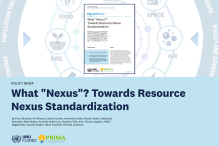WIDER Seminar Series event, featuring Prof. William D. Ferguson, the Gertrude B. Austin Professor of Economics at Grinnell College, at UNU-WIDER and online.
Distributions of power condition prospects for resolving collective-action problems of development. A systematic approach to power theory thus informs development economics and policy.Moreover, a triadic, as opposed to the more traditional dyadic, approach illustrates often subtle political dynamics that influence institutional trajectories and developmental prospects.
Merging and extending concepts that rarely appear jointly, I will open by summarizing foundational concepts. After briefly reviewing power’s sources, instruments, and manifestations, I will turn to its three dimensions (or faces): direct influence on behavior, such as the use of force (power1); manipulating rules and expectations, equivalent to strategic moves in game theory (power2); and manipulating beliefs about conflict (power3). The latter entails normative and political entrepreneurship.
Discussion will proceed to triadic power relationships. Dyadic power, a common approach in traditional political and economic discussions, considers only two parties—as in union-management bargaining. In contrast, triadic power involves three types of parties, each of which represents a pole of interaction with specific properties (e.g., ownership, management, labor). Moreover, such parties sometimes include the indirectly involved—perhaps “involved” by their mere presence. Exercises of power confer political externalities. In such cases, the dynamics may be subtle, yet consequential, as in the influence of potential rural-urban migration on informal and formal employment relationships and associated institutions.
Triadic power relations utilize seven basic formats—strategic templates—that may unfold separately or in combination, simultaneously or sequentially. These are: (i) threatening to disrupt an exchange between two other parties; (ii) using a third party to punish an adversary; (iii) demanding a return for taking sides in a dispute; (iv) sowing division among two or more potential adversaries (divide and conquer); (v) mediating disputes; (vi) benefiting from the mere presence of uninvolved parties; and (vii) limiting access to a desired position in a transactions arena: gatekeeping.
Discussion will proceed to examples and ideas on modeling, with particular attention to gatekeeping (vii) because it combines powers2 and 3 and often operates alongside other formats. Interestingly, those affected may not even be aware of power’s influence (“invisible power”).
These templates offer a lens for inquiry into how unequal distributions of power influence prospects for resolving developmental collective-action problems. For example, triadic power shapes patterns of conformity and convention that frequently pose substantial barriers to political reform and economic transformation.
On this basis, discussion will turn to agency, noting four, often overlapping, types of actors: leaders, entrepreneurs, brokers, and followers (or victims). Even the latter possess agency—as in deciding whether to submit or resist. Leadership—often involving normative or political entrepreneurship, and sometimes brokerage—mixes power2 and power3, via several triadic formats. Implications on institutional evolution, and by extension collective-action problems of development, such as reducing corruption follow.
About the presenter
Prof. William D. Ferguson, the Gertrude B. Austin Professor of Economics at Grinnell College, is the author of The Political Economy of Collective Action, Inequality, and Development and Collective Action and Exchange: A Game-Theoretic Approach to Contemporary Political Economy (Stanford 2020, 2013), and a coauthor of Political Settlements and Development: Theory, Evidence, Implications. Prof. Ferguson’s earlier research concerns theory of implicit bargaining power in employment relationships. He has taught classes on political economy, applied game theory, labor economics, and policy analysis. He is past Secretary-Treasurer of the Midwest Economics Association and chair and (key) founder of Grinnell’s Policy Studies Concentration.
WIDER Seminar Series
The WIDER Seminar Series showcases the latest research on key topics in development economics. It provides a forum for senior and early-career researchers, both in-house and external, to present recent and ongoing work related to UNU-WIDER’s current work programme.
In addition to providing a forum for both academic debate and training, the series presents an opportunity for policy makers and others interested in development to learn about the latest research methods and findings.
The WIDER Seminar Series events take place on Wednesdays. All those interested are invited to register and attend via Zoom or in person.



